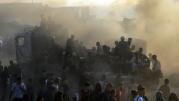A new study published by the Food and Agriculture Organization (FAO) and the UN Satellite Centre (UNOSAT) shows that only 8.6% of cropland in Gaza remains accessible, while only 1.5% of cropland is both accessible and undamaged, as of 28 July.
This report comes as ongoing Israeli attack pummels the beseized enclave and continued aid restriction triggers death by starvation, verging on famine.
Above 86% of the cropland is already damaged, while 12.4% is undamaged but out of reach, the FAO report adds.
Moreover, "Cropland in Rafah, North Gaza and nearly all cropland in the Gaza governorate are not accessible."
The decimated cropland, reflected on the emaciated population, indicates that not even agricultural areas were exempt of Israeli onslaught on the territory.
According to the latest estimate from Gaza's health authority, nearly 200 people, including 96 children, have died of hunger in Gaza, as the starving population are forced to make the impossible choice between starving or risking their lives while procuring so called aid form dangerous airdrops and murderous aid sites run by the Israel-run Gaza Humanitarian Foundation (GHF).

Report says the so-called Gaza Humanitarian Foundation is engaging in orchestrated killing under the guise of providing relief.
Doctors Without Borders, a medical non-profit which runs clinics in Gaza, has called for an immediate dismantling of the GHF, calling the sites run by the Israeli military and private American contractors as "laboratory of cruelty".
The GHF run aid sites are accused of "orchestrated killing" by the organization, as they say, in effect the militarised food distribution scheme has weaponised starvation and curated suffering.
"As of 13 July, we have recorded 875 people killed in Gaza while trying to get food; 674 of them were killed in the vicinity of GHF sites," said Thameen Al-Kheetan, OHCHR spokesperson, referencing the US-Israeli joint enterprise as early as 15 July.
Killings linked to the controversial GHF aid hubs began shortly after they started operating in southern Gaza on 27 May, dismantling the UN and other established NGOs.
Meanwhile, according to the UN aid coordination office (OCHA), hospitals are overburdened with many patients reduced to lying on the floor or in the streets.
This man-made suffering is further amplified as emergency medical teams were again denied entry into Gaza on Tuesday.
Since March, more than 100 health professionals, such as surgeons and other specialized medical staff, have been denied entry to the enclave as reported by the World Health Organization (WHO).
Meanwhile, the limited availability of fuel continues to restrict lifesaving operations, as UN health partners report that more than 100 premature babies are in imminent danger.






Comments